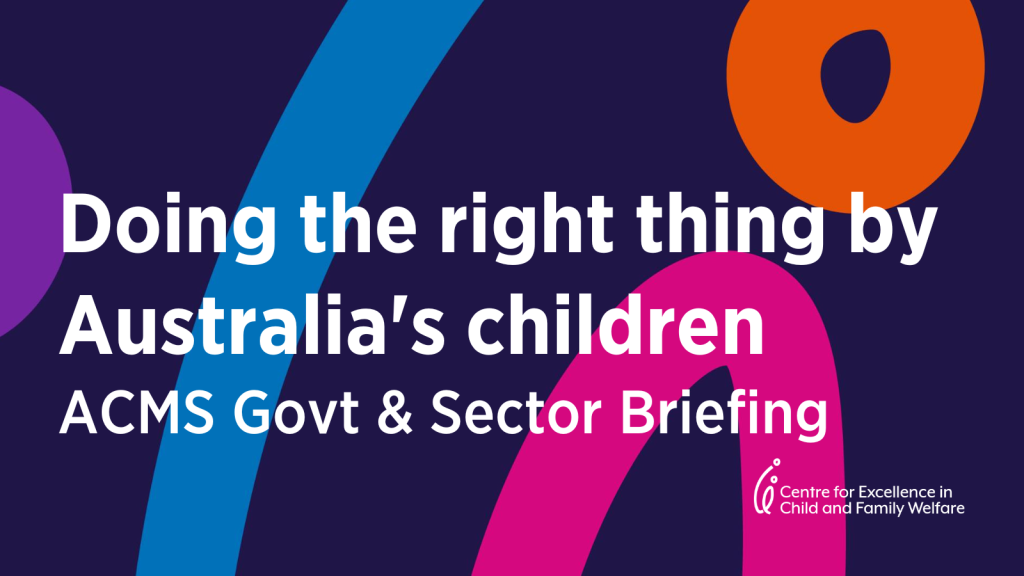The Centre for Excellence in Child and Family Welfare (the Centre) has has joined Federal and State Government and social services sector leaders calling for a coordinated national effort to end child maltreatment.
The Australian Child Maltreatment Study, undertaken by a consortium of research led by the Queensland University of Technology, shows that child maltreatment is widespread in Australia, and is having devastating consequences for their mental health and health risk behaviours now, and as adults.
Centre’s CEO Deb Tsorbaris said we have long known and struggled with the fact that many children in Australia experience abuse and neglect during childhood.
“What we didn’t know, until the release of the study in April this year, was the extent of the problem,” she said.
The study showed that 62.2 percent of Australians reported experiences of child maltreatment in their childhood, with almost half (48 percent) of these Australians meeting the criteria for at least one of the four mental health disorders measured – major depressive disorder, generalised anxiety disorder, alcohol use disorder and post-traumatic stress disorder.
Child maltreatment is also a gendered problem disproportionately affecting girls. More than one in three girls experienced child sexual abuse (37.3 percent): twice the rate of boys. More than one in three girls also experienced emotional abuse (35.7 percent): 1.4 times the rate of boys.
The consequences of child maltreatment in Australia can be seen in the concerning rates of self-harm among young adults, with those who experienced any form of child maltreatment being 3.5 times more likely than their peers to have self-harmed in the previous year, and 4.5 times more likely to have attempted suicide.
“For a country that prides itself on being progressive and punching above its weight in so many different cultural and sporting arenas internationally, Australia performs poorly when it comes to child maltreatment rates.
“We will continue to fail our children and young people if we can’t respond quickly to these findings,” Ms Tsorbaris said.
The Centre is calling for a national, coordinated approach to ensure we are raising children who are safe, nurtured, and able to thrive.
“Given the vulnerability of girls to sexual and emotional abuse, we need to strengthen our approach to the teaching of respectful relationships.
“We need a reset of gender norms that spreads beyond schools and deep into our communities, and we need to look at the relationships and attitudes to women we are modelling to young people – in our media, in parliament, in workplaces, and in homes.”
Through its gold-standard evidence base, the ACMS research gives us a chance to have a national conversation about our children and to use the research to guide our actions. It also gives us a clear blueprint for action, which is something policymakers and the child services sector have not had before.
“Thanks to this study we know exactly where to direct our energy, where the most urgent needs lie, and where we can have the most immediate short and long-term impacts.”
ENDS
About The Centre for Excellence in Child and Family Welfare
Deb Tsorbaris is CEO of the Centre for Excellence in Child and Family Welfare. The Centre is Victoria’s peak body for child and family services. The Centre provides sector training and facilitates and publishes research. We also advocate for better transitions for young people leaving state care, and better supports for struggling families. Visit www.cfecfw.asn.au for more information.
About the Australian Child Maltreatment Study
The Australian Child Maltreatment Study (ACMS) was funded by the National Health and Medical Research Council (2019-2023) APP1158750 with additional funding and contributions from the Australian Government. It was conducted by a consortium of researchers from Australia, the United States, and the United Kingdom. In partnership with the Social Research Centre, the ACMS collected data from 8503 Australians during 2021. The data collected provide the first nationally representative prevalence estimates of the five types of child maltreatment in Australia, and their associated health outcomes through life. Visit www.acms.au for more information.
Further support
This media release contains information about child abuse and neglect which may be distressing to some people in the community.
Blue Knot
The Blue Knot helpline is available to help adult survivors of childhood trauma and abuse, parents, partners, family and friends as well as the professionals who work with them. You can call the Blue Knot Helpline and Redress Support Service on 1300 657 380.
1800 RESPECT
1800RESPECT is the national domestic, family and sexual violence counselling, information and support service. If you or someone you know is experiencing, or at risk of experiencing, domestic, family or sexual violence, call 1800RESPECT on 1800 737 732 or chat via their website (www.1800RESPECT.org.au).
Kids Helpline
Kids Helpline is Australia’s only free and confidential, 24/7 online and phone counselling service for young people aged 5-25 years. Free call 1800 55 1800 or www.kidshelpline.com.au
13 YARN
13YARN is the first national crisis support line for mob who are feeling overwhelmed or having difficulty coping. We offer a confidential one-on-one yarning opportunity with a Lifeline-trained Aboriginal and Torres Strait Islander Crisis Supporter. If you, or someone you know, are feeling worried or no good, we encourage you to connect with 13YARN on 13 92 76 (24 hours/7 days) and talk with an Aboriginal or Torres Strait Islander Crisis Supporter.
Lifeline Australia
If you or someone you know needs crisis support, please phone Lifeline on 13 11 14






